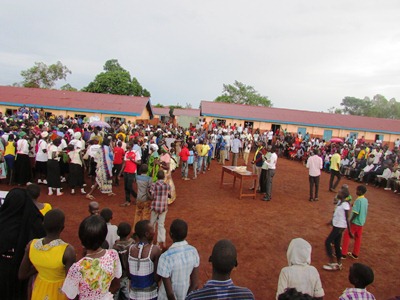S. Sudanese refugees hope to return home after peace
April 30, 2016 (BWEYALE) – South Sudan refugees in Uganda say they now feel relieved after the country’s warring factions formed the Transitional Government of National Unity (TGoNU).

Malow Riak, the vice chairperson of the community in Bweyale, said South Sudanese refugees in Uganda are now free to return home and being another life in their nation.
“The return of first vice president to Juba has now given us hope to go back to South Sudan because this is real peace,” he said.
Riak said life in exile makes one not free and is unable to participate in development and decision making process.
“It is always here in Bweyale, we say one day we will go back home. From today and tomorrow many of us shall return home,” stressed.
John Junub, a musician who fled the country after the crisis in December 2013, said South Sudanese were tired of war.
He, however, believes the signed peace accord between warring parties will hopefully re-unite people after the war.
“The peace signed by Dr. Riek Machar and president Salva Kiir shall be the last end of war in South Sudan. We believe their coming once more on the table by forming transitional government of national unity is a good sign for us,” he said.
The renowned singer vowed to carry out peace-related messages through his music to unite South Sudanese, adding that it’s through music that people will shun tribalism.
Martha Nyakume, a church leader in Bweyale, said the peace be embraced by South Sudanese leaders and citizens.
More than 20 months of the conflict, she said, traumatised women, many of who were raped and exposed to suffering.
Deng Thomas, a refugee from Jonglei state, said he would go back to his country as soon as stability was restored.
The conflict, which broke out in December 2013, has negatively impacted on the country’s citizens, including pushing the country to the brink of famine with 5.8 million people, almost half of the population—in desperate need of humanitarian assistance, according to a recent joint United Nations assessment on food security.
(ST)
